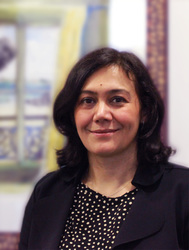Dr. Shirin Naef
Department of Social Anthropology and Cultural Studies, University of Zurich
Curriculum Vitae
Dr. Shirin Naef is an anthropologist and primarily works in an interdisciplinary field between law, religion, and ethics, focusing specifically on the Persian-speaking cultural area. She was a student of Theater and English in Teheran before studying Anthropology, Islam Studies, and Linguistics at the University of Bern (Switzerland) from 2002 to 2008. From 2009 to 2012, she was a recipient of a DFG stipend and a member of the graduate research center for bioethics at the International Center for Ethics in the Sciences (Internationales Zentrum für Ethik in den Wissenschaften, IZEW) at the University of Tübingen. In 2011, she additionally completed a fellowship at the School of Social Anthropology at the University of Manchester. In 2015, she was also a visiting researcher at the Brocher Foundation in Geneva. Most recently, Shirin Naef earned her doctoral degree from the University of Zurich’s Faculty of Philosophy in 2017 with a dissertation on “Kinship, Law and Religion: An Anthropological Study of Assisted Reproductive Technologies in Iran”. She is currently an associate researcher at the University of Zurich’s Institute for Social Anthropology and Empirical Cultural Science (Institut für Sozialanthropologie und Empirische Kulturwissenschaft, ISEK).
Dr. Naef’s main research interests include Shia Islam and jurisprudence (fiqh), bioethics, theology from a comparative perspective, material culture, and the history of science. Furthermore, Dr. Naef focuses on reproductive medicine, kinship, and sexuality and has been researching topics including philanthropy, the common good, morality, and economy since 2017.
From October 2018 to June 2019 Dr. Shirin Naef was Fellow at the Käte Hamburger Center for Advanced Study in the Humanities “Law as Culture”.
Research Project
"Economy, Law and Religion: A Study of Shia Philanthropy in Iran"
This research project seeks to explore traditions of philanthropy throughout Shia history, in both conceptual and institutional terms. It also traces the implications of these traditions in framing the laws and regulations regarding charitable and related economic, religious, and socio-cultural activities in Iran. The main objective of the study is to contextualize and investigate how and why various Shia religious legal authorities belonging to different traditions, both in historical and contemporary periods, discuss, understand, and develop their arguments and reasoning behind giving and philanthropic activities. Drawing on theoretical insights from anthropology, law, religion, and Islamic studies, this project also examines the socio-cultural, normative, legal, and religious aspects that emerge from these debates.
During my fellowship at the Käte Hamburger Center for Advanced Studies in Humanities “Law as Culture”, I will be focusing primarily on two areas: The first concerns the issue of khums, one of the important pillars of the Islamic economic system, particularly in the Shia tradition. In addition to zakāt (religiously obligatory almsgiving in Islam), there is another decentralized and religious tax system known as khums (‘one-fifth’), a religious-legal principle of devoting the annual surplus of one’s income to an upright religious authority (marjaʿ-e taqlīd) in Shia law. Half of the khums is considered to be the share of the Imam (Shia spiritual and political leader), and the remaining half goes to needy sādāt (descendants of the Prophet through his daughter Fatima). As such, khums is one of the major financial sources of the Shia clerical establishment as well as its independent educational and charitable institutions. While looking at the relationship between law and economy from a comparative perspective, I will explore contemporary Shia debates and understandings of khums as well as its implications and challenges regarding the regulation and development of both the religious and state tax systems in the Iranian context. The second area is a continuation of my interest in Islamic jurisprudence (fiqh), especially the Shia School and its relation to modern legal concepts, morality, and governance. Shia law influences Iranian civil law. Accordingly, through the prism of philanthropy in this study, I will investigate how the interplay of religious and civil law affect the formulation of moral concepts and principles, legal regulations, and socio-economic policy.
This research will form an important part of a planned monograph on varieties of religious philanthropy and their place in the material, cultural, legal, and economic context of Iranian life and society.
Publications (selected)
- Kinship, Law and Religion: An Anthropological Study of Assisted Reproductive Technologies in Iran, Tübingen: Francke Verlag 2017.
- Bioethik im Iran, in: Ludwig Paul (ed.): Handbuch der Iranistik, Vol. 2, Wiesbaden: Reichert Verlag 2017, pp. 174-179.
- Legal Status, Moral Values and Cosmological Order: Embryo Politics in Iran, in: Ethnologie française 2017/167 (3), pp. 459-470.
- The Iranian Embryo Donation Law and Surrogacy Regulations: The Intersection of Religion, Law and Ethics, in: Die Welt des Islams. International Journal for the Study of Modern Islam 2015/55 (3-4), pp. 348-377.
- Modern Reproductive Technologies in the Light of Traditional Ontologies: An Anthropological Reflection on Assisted Reproduction in Iran, in: Robert Ranisch / Sebastian Schuol / Marcus Rockoff (ed.): Selbstgestaltung des Menschen durch Biotechniken. Tübingen: Francke Verlag 2015, pp. 157-171.
- Gestational Surrogacy in Iran: Uterine Kinship in Shia Thought and Practice, in: Marcia Inhorn and Soraya Tremayne (ed.): Islam and Assisted Reproductive Technologies: Sunni and Shia Perspectives. New York/Oxford: Berghahn Books 2012, pp. 157-193.
- Gestational Surrogacy in Iran, in: Medical Journal of Reproduction and Infertility 2008/9 (1), pp. 50-64. (in Persian)


